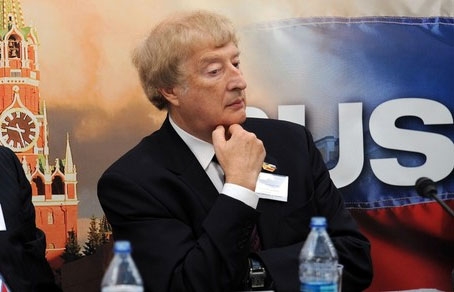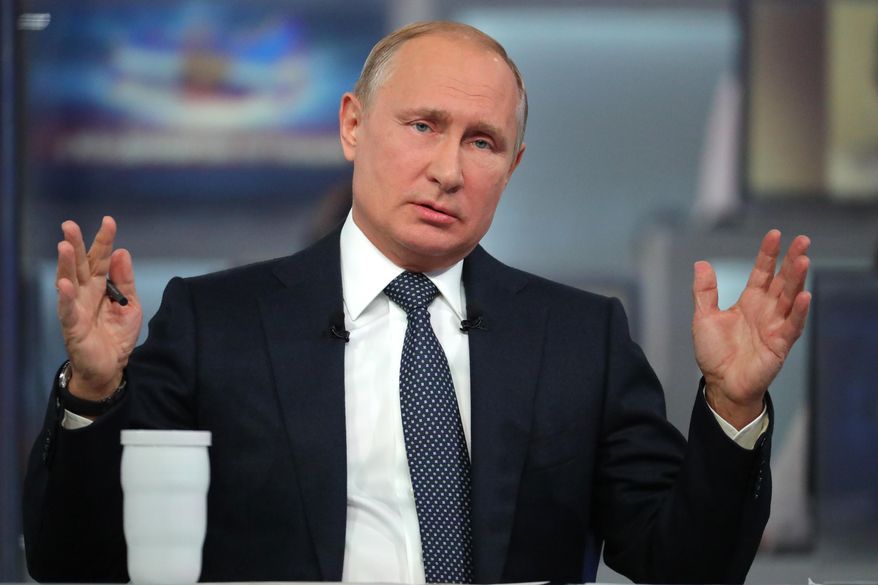
 CROSSTALK: Syria and Ukraine are thorny issues for U.S. and Russia
CROSSTALK: Syria and Ukraine are thorny issues for U.S. and Russia
 "Our military is [in Syria] to ensure Russia's interests in an important region of the world," said Russian President Vladimir Putin, responding to one of the screened questions selected from more than 2 million submitted by citizens. (Associated Press)
"Our military is [in Syria] to ensure Russia's interests in an important region of the world," said Russian President Vladimir Putin, responding to one of the screened questions selected from more than 2 million submitted by citizens. (Associated Press)
CROSSTALK: Syria and Ukraine are thorny issues for U.S. and Russia
It seems that U.S. President Donald Trump and Russian President Vladimir Putin will finally meet for a formal summit in July, probably in Austria or another European country. It’s been a long time coming, thanks to an unprecedented and so far successful campaign to prevent any rapprochement or substantial cooperation between the world’s two top nuclear powers.
Why the shift now? One explanation is Mr. Trump’s rising popularity due to economic and other domestic policy successes. Even The New York Times admits that the U.S. economy is the strongest it’s been in years. On the foreign
stage Mr. Trump’s triumph in breaking the Korean logjam shows that perhaps he knows more than so-called "experts” who have been loudly screaming about his ignorance of international affairs.
Most importantly, with the "Russiagate” narrative collapsing Mr. Trump may now feel freer to move on one of the key items of his campaign agenda, which is to improve U.S.-Russia relations. He rightly believes that only "haters and fools do not understand that getting along with Russia is a good thing, not a bad thing.”
The "Russian collusion” narrative is increasingly being unmasked as a baseless fabrication and is ever more eclipsed by exposure of criminal wrongdoing within the Department of Justice and Jim Comey’s FBI. More and more Americans realize that it was not Mr. Trump who undermined our democracy but the Obama-Clinton political machine that, in the best Soviet tradition, chose
which candidate would be nominated, with the
intelligence services geared up to assure his (in this case her) victory.
Make no mistake, though, resistance to better ties with Russia is not gone. No top official, either career or politically appointed, except possibly U.S. Ambassador in Moscow Jon Huntsman, appears to shares Mr. Trump’s desire to make a deal with Mr. Putin. Between now and the summit one can expect efforts to derail it.
Still, there are issues that are sure to be raised one way or the other.
Messrs. Trump and Putin shouldn’t bother discussing lifting U.S. sanctions on Russia since Congress, in a case of rare bipartisanship, would block it. The only significant deliverable is if Mr. Trump offers to not penalize European companies doing business with Russia, notably on Nord Stream 2. Perhaps progress can be made on restoring diplomatic staffing to normal levels.
On Syria, the U.S. must accept the fact that Bashar al-Assad will stay in power. The notion of partitioning Syria and creating an eastern "Sunnistan” to bar Iranian influence isn’t viable. Agreement to keep the Iranians and Hezbollah out of areas vital to Israel is more doable.
It’s time to move forward on what Mr. Trump has always said was his preference – and get us out of Syria.
The thorniest problem will be Ukraine. Mr. Trump should know that the seeds of Ukraine’s instability were planted long before Mr. Putin’s rise to power, arising from a combination of factors.
First, Ukraine’s inherent fault lines are those of a weak, oligarch-corrupted, regionally dissimilar entity cobbled together, in most cases contrary to popular wishes, by a communist gang of four - Lenin, Trotsky, Stalin and Khrushchev.
Second, Moscow’s suspicion that the 2014 Western- supported unconstitutional regime change had very little to do with bringing freedom, democracy and prosperity to the Ukrainian people is well-founded. At stake were further NATO expansion in the post-Soviet space and a
dramatic geopolitical weakening of the Russian
Federation.
Faced with a vital security challenge on Russia’s doorstep, Mr. Putin was forced to react. Whether his reaction was the right one is debatable, but so are U.S. actions in places not essential to American security, like Serbia, Iraq, Libya, Syria – and Ukraine.
The issue for Mr. Trump is what to do now. One thing should be clear: Crimea will not "return” to Ukraine. A judicious move by Mr. Trump would be to formalize the position that the U.S. does not recognize Crimea’s reincorporation but that such non-recognition will not impede ties with Moscow. This would be analogous to the American policy on the Baltic states after their absorption into the
USSR under Stalin.
With regard to the Donbass, Mr. Putin pointedly has not accepted the declared independence of the Donetsk and Lugansk republics. That said, continued bashing of Moscow for not "implementing the Minsk 2 agreement” just lets Kiev off the hook for its failure to offer viable
self-governance to the Donbass, perhaps under a federal scheme like the U.S., Russia and many other countries have.
In any case, Russia cannot and will not accept an imposed military solution. It’s time to abandon Zbigniew Brzezinski’s and other Russophobes’ idea of pitting two Orthodox Slavic nations against each other to satisfy the geopolitical ambitions of self-anointed "exceptional” and "indispensable” neo-Trotskyite rulers of the universe.
In anticipation of the Trump-Putin summit details perhaps matter less than a mutual will to improve relations and move forward. That’s what Mr. Trump was bold enough to do in Singapore. We’ll see if he can do it again in this much more far-reaching context.
Edward Lozansky is president of the American University in Moscow, Professor of Moscow State and National Research Nuclear Universities. He is the author of the book "Operation Elbe”, which describes joint US – Russia anti-terrorist efforts.



.jpg/250px-ElbeDay1945_(NARA_ww2-121).jpg)





